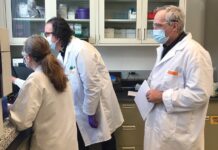PROVIDENCE — The first target of immunology engineering biotech firm EpiVax Inc.’s latest antigen-specific therapies? Graves’ disease, an auto-immune condition that results in hypothyroidism.
Current therapies not only carry potential side effects, but they can also require lifelong replacement therapy and don’t get at the overall cause of the condition, EpiVax said in a news release.
EpiVax will use Small Business Innovation Research funding in developing a Tregitrope-biotherapeutic, or Treg-BT, intended to restore immunological balance in Graves’ disease patients. Tregitopes, a set of peptides, can downregulate inflammation, according to the release.
Building on work conducted by her father, endocrinologist Leslie De Groot; Dr. Anne S. De Groot, EpiVax founder, CEO and chief science officer; and researchers Eduardo Guillen, Ricardo Correa and Dr. Geetha Gopalakrishnan – with support from Hidefumi Inaba – will collaborate with health care company Lifespan Inc. in producing a Treg-BT platform.
It could mean eventual drug- and surgery-free solutions for the 300,000 Americans with Graves’ disease, according to EpiVax.
Lifespan is also looking forward to the possibilities.
“We believe that this therapeutic approach directly addresses the underlying auto-immune process causing the disease, and could potentially augment or replace current treatments in Graves’ disease,” said Gopalakrishnan, director of the Division of Endocrinology at the Warren Alpert Medical School of Brown University. “This type of … therapy will clearly have implications for the treatment of a wide range of other T-cell mediated auto-immune diseases.”
Susan Shalhoub is a PBN contributor.













